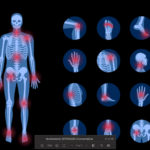In a large cohort study of women with inflammatory polyarthritis, researchers have shown that the use of oral contraceptives is associated with a beneficial functional outcome when used either before or at symptom onset.
Published in Arthritis & Rheumatism, the study used the Norfolk Arthritis Register (NOAR) to identify 663 patients with recent-onset polyarthritis.1 Of these women, 523 had used oral contraceptives prior to symptom onset and 265 had used birth control pills in the post-onset analysis cohort. In the group with oral contraceptive use before symptom onset, Health Assessment Questionnaire (HAQ) scores were lower throughout follow-up than for patients who had not taken birth control pills. Patients who were taking oral contraceptives at symptom onset had lower HAQ scores over time than women who were not taking the pills.
Megan E.B. Clowse, MD, assistant professor of medicine at Duke University in Durham, N.C., called the study interesting but controversial. “Several studies have shown varying responses to oral contraceptives,” she says. “One study will say birth control pills decrease risk, while another shows increased risk. It seems to be going back and forth in the literature.”
According to Dr. Clowse, although the study shows good follow-up and robust data, she believes that further proof is still needed and suggests a randomized, controlled study. “This paper is suggestive that maybe we should be looking at this as a modifying factor in disease activity,” she notes.
Dr. Clowse posits this study’s take-home message for rheumatologists is that oral contraceptives might ameliorate disease in the long term. “This paper wouldn’t make me start people on birth control pills,” she says. “But, it does decrease any concern that oral contraceptives would worsen a condition like rheumatoid arthritis.”
Authors of the study note that several possible mechanisms may account for the apparent relationship between oral contraceptive use and disease outcome. Oral contraceptives work, in part, “by maintaining an artificially high level of progesterone and estrogen, thus maintaining an artificial luteal phase,” they state in their paper. “An alternative explanation may be that the hormonal milieu induced by OC (oral contraceptive) use results in an increased level of heat-shock proteins, which in turn leads to a state of immunotolerance, tempering [rheumatoid arthritis] symptoms.”
Sue Pondrom is a medical journalist based in San Diego.
Reference
- Camacho EM, Lunt M, Farragher TM, Verstappen SM, Bunn DK, Symmons DP. The relationship between oral contraceptive use and functional outcome in women with recent-onset inflammatory polyarthritis. Arthritis Rheum. 2011;63:2183-2191.


